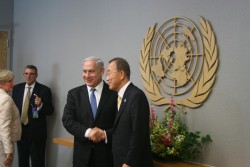It looks like current Prime Minister Benjamin Netanyahu will get to keep his title, as President Shimon Peres has officially asked Netanyahu to form the next coalition government. As the leader of the largest party in the new Knesset (parliament)—Likud-Yisrael Beiteinu—Netanyahu had a clear edge in being tasked with the coalition-forming, and according to a press release 82 of the Knesset’s 120 members recommended Netanyahu for the job.
That won’t make the process of forming a coalition of parties, consisting of the majority of Knesset seats, an easy one. The center-right Likud-Beiteinu party only received 31 seats, and the second largest party—the center-left Yesh Atid—took 19, leaving Netanyahu with the need to not only recruit Yesh Atid, but find at least one more party to join with them.
Netanyahu himself, in comments in the press release on his being tasked with forming the government, said he wants to form “a national unity government, as wide and stable as possible.” He asked even the parties who have so far not supported his premiership to reconsider and join the coalition.
The fourth largest party with 15 seats, Labor, has announced in the Israeli media that they do not plan to join the coalition. The next largest parties are the rightist Habayit Hayehudi party (12 seats) and the ultra-orthodox religious parties—Shas (11 seats) and United Torah Judaism (7 seats).
According to Ynet, the process of forming the next coalition is already underway. Based on his own words, Netanyahu already has a general vision for the next coalition in mind. In his comments to the cabinet on Sunday, Netanyahu said the new government has to deal with the Iranian nuclear threat, even as Iran is reportedly making progress in enriching uranium for nuclear fuel.
“The supreme mission that a national unity government will face is stopping Iran from arming itself with nuclear weapons,” Netanyahu was quoted by his office as saying. “This is all the more complicated because Iran has equipped itself with new centrifuges that shorten the enrichment time. We cannot countenance this process.”
Beyond the security issues, Netanyahu said he also wants the next government to focus on three areas: a “responsible budget” and making reforms so as to lower the cost of living; to “significantly increase equality” in sharing the civic burden; and to “move forward on a responsible and realistic diplomatic process.”
“We need to deal with these three tasks all at the same time and not deal with only one or two of them,” said Netanyahu. “Reality and time demands this and it is possible only with a broad national unity government. Our goal is to unite the nation around these tasks and not divide it. Only as broad a union of forces as possible will enable us to meet these tasks and to ensure the future of the State of Israel.”
Yesh Atid, which according to Ynet, has publicly endorsed those three areas as well as education reforms, recommended Netanyahu to head the government but has yet to commit to joining the coalition.
In a press release last week following a meeting with Peres on nominating Netanyahu, Yesh Atid Chairman Yair Lapid said their platform called for government reforms that would mandate that the head of the largest Knesset party be tasked with forming the government. In light of that, they recommended Netanyahu, but Lapid noted that “does not mean we will sit in the coalition, nothing is finalized yet.”
(By Joshua Spurlock, www.themideastupdate.com, February 3, 2013)

